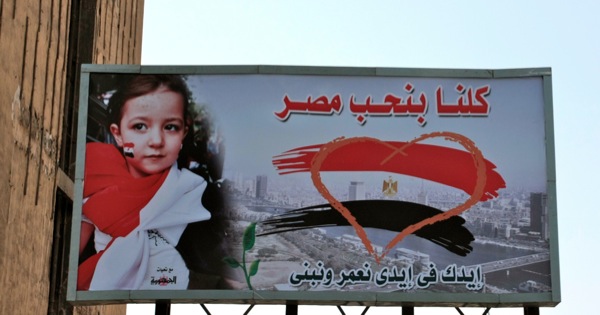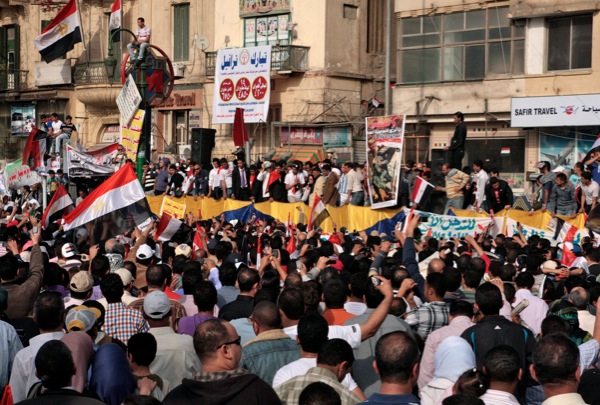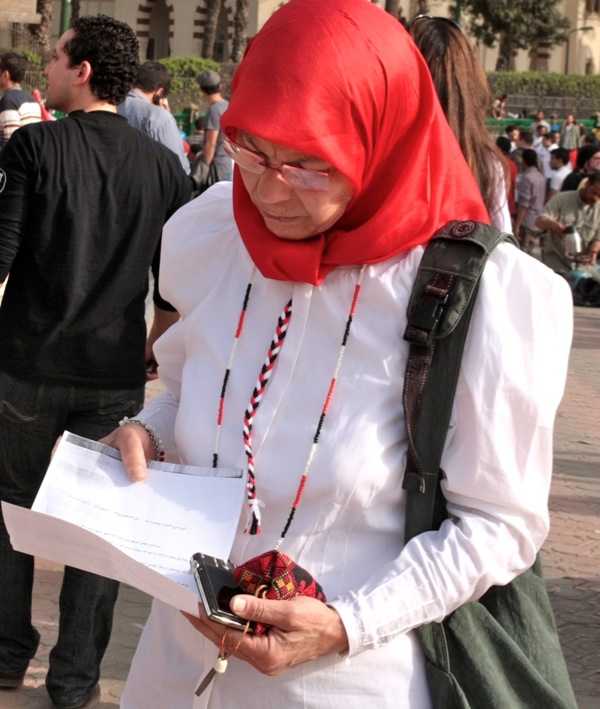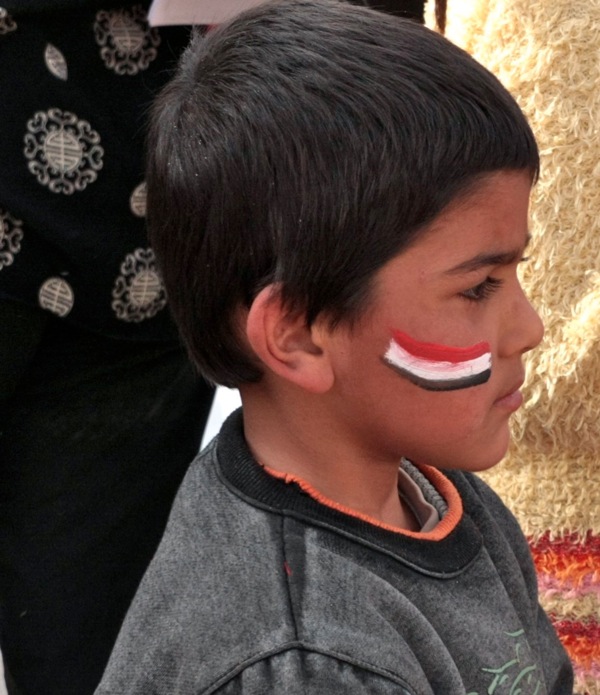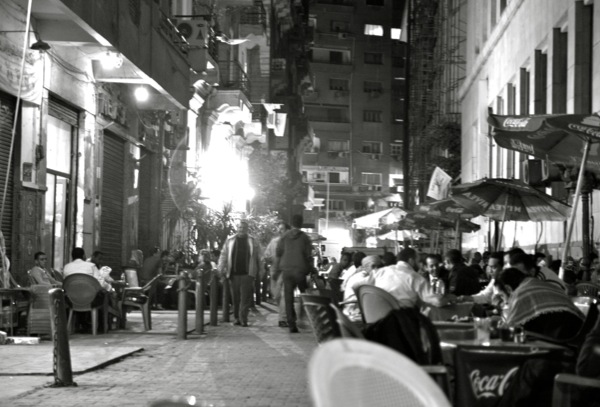CAIRO — Yasmin, an attorney and democracy activist, said that this past Friday’s demonstration at Tahrir Square was the biggest she’d seen since Mubarak resigned. “This is the old spirit of the revolution,” she said, as Ramy Essam, a musician who composed and performed a now-famous song at Tahrir during the revolution, played the guitar and sang from the stage. That was his first performance since he was arrested, and badly beaten by soldiers three weeks earlier. At one point, he removed his shirt to show the audience the still visible bruises and scars on his torso.
[youtube]http://www.youtube.com/watch?v=-rEKmTBKiBM[/youtube]
There were thousands of people in Tahrir, far more than the previous Friday, and it seemed as though they all cheered and waved flags when the mother of Khaled Said, whose violent death at the hands of police thugs was a watershed event leading up to the revolution, was introduced from the stage. A small, veiled woman dressed in black, she spoke forcefully of the need to continue the revolution begun on January 25.
After Khaled Said’s mother finished speaking, a man took the microphone and intoned a prayer for the martyrs of the revolution.
There were also calls for the resignation of Field Marshall Tantawi, the head of the military council that currently rules Egypt.
The theme of Friday’s demonstration was taking back the revolution, which seems to have stalled over the past couple of weeks. Democracy activists are frustrated by the army, which has been slow to implement reforms – such as lifting the emergency laws and prosecuting corrupt officials of the Mubarak regime. The military council is starting to respond to demands to fire university deans and newspaper editors that were appointed by Mubarak, but only after weeks of strikes and demonstrations. In an editorial for independent newspaper Daily News Egypt, Rania al Malky lists 26 questions Egyptians are asking – like why aren’t Mubarak and his family on trial, and why is the emergency law still in place.
The army is acting with increasingly repressive practices. A few days ago, soldiers arrested a 22 year-old blogger, Michael Nabil, at his home. He was targeted for publishing reports about the army’s violence toward protestors. Nabil is charged with insulting the military, spreading false information, and disturbing public security. He is a Copt and a pacifist who refused the draft, which probably does not help his case.
My impression is that, beyond the core group of democracy activists one sees at pretty much every demonstration, a lot of the protesters one saw during the revolution are simply tired. Last week one acquaintance said that she and all her friends had planned to go to Tahrir for the Friday demo, but in the end no-one showed up. “We have lives to live,” she said.
This past Friday at Tahrir, it felt as though the core activists were working very hard to muster their waning energy. They spoke enthusiastically, but sometimes I felt as though they were running on empty, or on a combination of hope and – well, hope. Yasmin now spends all her time outside work in activism, primarily under the auspices of a movement called Almasry Alhurr (The Free Egyptians). She says she was not political before the revolution, but the demonstrations that started on January 25 galvanized her, and she’s been working non-stop ever since. Are you optimistic? I asked, after she had spent a few minutes describing the army’s recent repressive actions as a ‘counter revolution.’ She answered, “We have to be optimistic. Otherwise we will lose all we’ve gained.”
Banners strung from trees and lampposts called for the cancellation of a recently introduced ban on political demonstrations during working hours, for the return of wealth plundered by Mubarak and corrupt members of his regime and for the speedy prosecution of those responsible for killing demonstrators during the revolution. There was a sort of Speaker’s Corner atmosphere, with clusters of people engaged in animated political discussions about a variety of issues. Democracy activists were engaged in the grassroots work of starting new political parties, passing out information that explained their party platforms, listed the names and bios of the candidates and the dates of their upcoming talks.
Parliamentary elections are to be held in September, which allows very little time for organizing – and the activists know it. “We need at least six months to organize properly,” said Rania, an organizer for the Egyptian Social Democratic Party, which advocates a Scandinavian model of government that combines an open market with the state taking responsibility for health, education and labour unions. She said they had signed up 6,000 members in just a couple of weeks, and expected to sign up a thousand more that Friday in Tahrir. “But there’s no way we can compete with the established parties, like the Muslim Brotherhood and the National Democratic Party, so we are looking for alliances with other leftist groups,” she added.
It’s widely believed that the army wants early elections precisely in order to prevent new political parties from organizing and posing a significant challenge to the status quo. Like many others in the democracy movement, Yasmin, the attorney who is active in Almasry Alhurr, finds herself in the uncomfortable position of having to trust an institution she does not trust on principle – the army – to keep its word and shepherd Egypt toward transparent elections leading to a liberal democratic state. There is no real choice at the moment.”If the army chooses to repress this revolution violently,” she remarked, “There would be absolutely nothing we could do to stop them.”
But the activists who criticize the army tell me over and over that they are a small minority. They know they are not representative, and they know they are out of touch with Egyptians that live in the villages and towns outside of Cairo. Most people, they say, regard the army as a stabilizing, protective force that looks out for the best interests of the people.
A friend who accompanied me to Tahrir complained about the commercialization of the revolution and the carnival atmosphere, with snack stands and memorabilia – January 25 T-shirts, bumper stickers, flags and laminated photos of martyrs to the revolution strung from lanyards. He was particularly angry about a sign on a snack van sponsored by Chipsy, a local potato chip manufacturer: Buy five bags of Chipsy brand potato chips, read the sign, and receive the sixth bag free – for the revolution.
The combination of carnival atmosphere and serious political action reminded me of the demonstrations at Sheikh Jarrah, the East Jerusalem neighborhood where demonstrators gather each Friday to protest the eviction of Palestinians from their homes, which have been taken over by Jewish settlers. Over the past year, the weekly demonstrations, which began in December 2009 with violent confrontations between anarchists and riot police, have settled into a more sedate routine, with the anarchists joined by middle class leftists, often in family groups. Meanwhile, East Jerusalem Palestinian kids sell coffee, orange juice and popcorn to the mostly Jewish demonstrators.
At Tahrir, many of the children stopped to have the red, black and white stripes of the Egyptian flag painted on their cheeks – like this little boy who collected used plastic bottles for recycling.
Over the past few days, several Egyptian activists asked my opinion about their revolution. They asked not because they had an opinion and wanted to see if I shared it, but because – and they say this openly – they don’t know what to think anymore. The people who asked me included a Coptic man who works for a multi-national company; a Muslim woman who works in hi-tech and veils ‘because wearing [the hijab] doesn’t bother me and taking it off just isn’t worth the trouble it’ll cause with my family’; and a leftist activist who hangs out with anarchists but says he’s a socialist. The question usually comes up after we’ve batted around a few theories about the army’s intentions and the direction the revolution is taking, how long it will take to achieve a liberal democracy, or whether it will be achieved at all. After a few rounds of ‘on the one hand, but on the other hand,’ they’ll catch themselves, smile at me, and ask, “So what do you think will happen?”
One friend started out by saying that perhaps this was as far as the army would let the revolution go – allowing demonstrations at Tahrir, a bit more press freedom, dismissal of some Mubarak appointees in the media and academia, and prosecution of the more egregiously corrupt Mubarak regime officials. A few minutes later, that same friend introduced me to democracy activists who are pouring every bit of energy they have into organizing political parties and grassroots activism.
Walking around Tahrir on Friday and talking to people, my mood and opinions swung back and forth. Like my Egyptian acquaintances, I felt discombobulated at having no reliable gut sense of where this revolution was heading. One minute I was convinced the army intended to consolidate its grip on power via a Mubarak ‘lite’ style of government; and the next minute I would have a fascinating conversation with a brilliant, committed democracy activist who had a clear, pragmatic vision of Egypt’s future. One day I was totally depressed at having yet another acquaintance cancel our meeting out of fear of being associated with me (a foreigner of a particularly undesirable type); and the next day I was sitting at an ‘ahwa,’ a traditional café in the borsa district, surrounded by intelligent, well-informed activists – including an Egyptian anarchist who asked me to send his regards to an Israeli anarchist he knew.
On Friday evening, after a long conversation with a group of people at one of those ahwas, a friend remarked that I was probably starting to feel as though I were finally gaining some insight and understanding into what I was seeing. That was a smart observation. One of the things I learned from reporting in Gaza, the West Bank and East Jerusalem is that it’s very risky to write an article based purely on having witnessed an incident. If you don’t know who the main players are, you don’t speak the language and you have only just arrived in a place, chances are very high that you don’t understand what you’re seeing. That is why I have been so cautious in my initial reports from Cairo. And that is why I have decided to extend my stay a bit. I need to get out of Cairo to visit the Delta region as well as other cities. And several stories that I have been working on for more than a week are just now starting to come together.
Meanwhile, I have almost finished another post – a bit more lighthearted than this one. It is a story about my meting with Heba, the hijab-wearing Egyptian Hebrew teacher. Really.
If you enjoyed this article and would like to make a payment toward reader-sustained freelance journalism, please click here. You will be taken to my old blog, where I have cross-posted this article. Scroll to the bottom of the post and click on the yellow ‘donate’ button.


